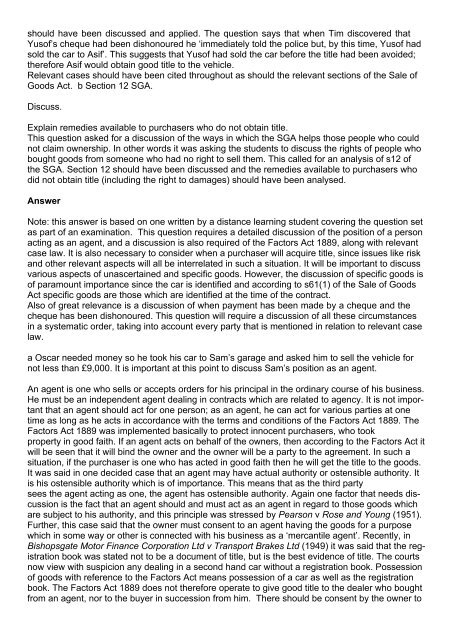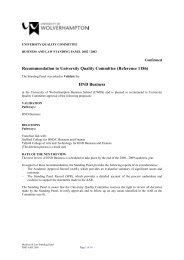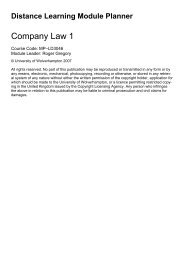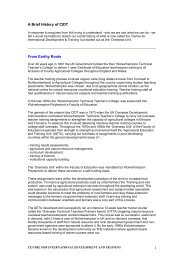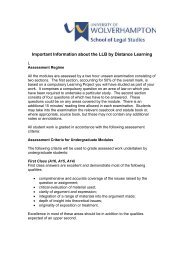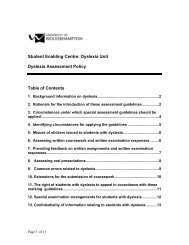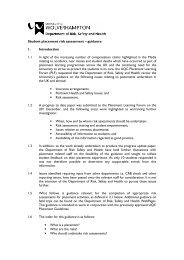Commercial Law: Sale of Goods - University of Wolverhampton
Commercial Law: Sale of Goods - University of Wolverhampton
Commercial Law: Sale of Goods - University of Wolverhampton
You also want an ePaper? Increase the reach of your titles
YUMPU automatically turns print PDFs into web optimized ePapers that Google loves.
should have been discussed and applied. The question says that when Tim discovered thatYus<strong>of</strong>’s cheque had been dishonoured he ‘immediately told the police but, by this time, Yus<strong>of</strong> hadsold the car to Asif’. This suggests that Yus<strong>of</strong> had sold the car before the title had been avoided;therefore Asif would obtain good title to the vehicle.Relevant cases should have been cited throughout as should the relevant sections <strong>of</strong> the <strong>Sale</strong> <strong>of</strong><strong>Goods</strong> Act. b Section 12 SGA.Discuss.Explain remedies available to purchasers who do not obtain title.This question asked for a discussion <strong>of</strong> the ways in which the SGA helps those people who couldnot claim ownership. In other words it was asking the students to discuss the rights <strong>of</strong> people whobought goods from someone who had no right to sell them. This called for an analysis <strong>of</strong> s12 <strong>of</strong>the SGA. Section 12 should have been discussed and the remedies available to purchasers whodid not obtain title (including the right to damages) should have been analysed.AnswerNote: this answer is based on one written by a distance learning student covering the question setas part <strong>of</strong> an examination. This question requires a detailed discussion <strong>of</strong> the position <strong>of</strong> a personacting as an agent, and a discussion is also required <strong>of</strong> the Factors Act 1889, along with relevantcase law. It is also necessary to consider when a purchaser will acquire title, since issues like riskand other relevant aspects will all be interrelated in such a situation. It will be important to discussvarious aspects <strong>of</strong> unascertained and specific goods. However, the discussion <strong>of</strong> specific goods is<strong>of</strong> paramount importance since the car is identified and according to s61(1) <strong>of</strong> the <strong>Sale</strong> <strong>of</strong> <strong>Goods</strong>Act specific goods are those which are identified at the time <strong>of</strong> the contract.Also <strong>of</strong> great relevance is a discussion <strong>of</strong> when payment has been made by a cheque and thecheque has been dishonoured. This question will require a discussion <strong>of</strong> all these circumstancesin a systematic order, taking into account every party that is mentioned in relation to relevant caselaw.a Oscar needed money so he took his car to Sam’s garage and asked him to sell the vehicle fornot less than £9,000. It is important at this point to discuss Sam’s position as an agent.An agent is one who sells or accepts orders for his principal in the ordinary course <strong>of</strong> his business.He must be an independent agent dealing in contracts which are related to agency. It is not importantthat an agent should act for one person; as an agent, he can act for various parties at onetime as long as he acts in accordance with the terms and conditions <strong>of</strong> the Factors Act 1889. TheFactors Act 1889 was implemented basically to protect innocent purchasers, who tookproperty in good faith. If an agent acts on behalf <strong>of</strong> the owners, then according to the Factors Act itwill be seen that it will bind the owner and the owner will be a party to the agreement. In such asituation, if the purchaser is one who has acted in good faith then he will get the title to the goods.It was said in one decided case that an agent may have actual authority or ostensible authority. Itis his ostensible authority which is <strong>of</strong> importance. This means that as the third partysees the agent acting as one, the agent has ostensible authority. Again one factor that needs discussionis the fact that an agent should and must act as an agent in regard to those goods whichare subject to his authority, and this principle was stressed by Pearson v Rose and Young (1951).Further, this case said that the owner must consent to an agent having the goods for a purposewhich in some way or other is connected with his business as a ‘mercantile agent’. Recently, inBishopsgate Motor Finance Corporation Ltd v Transport Brakes Ltd (1949) it was said that the registrationbook was stated not to be a document <strong>of</strong> title, but is the best evidence <strong>of</strong> title. The courtsnow view with suspicion any dealing in a second hand car without a registration book. Possession<strong>of</strong> goods with reference to the Factors Act means possession <strong>of</strong> a car as well as the registrationbook. The Factors Act 1889 does not therefore operate to give good title to the dealer who boughtfrom an agent, nor to the buyer in succession from him. There should be consent by the owner to


